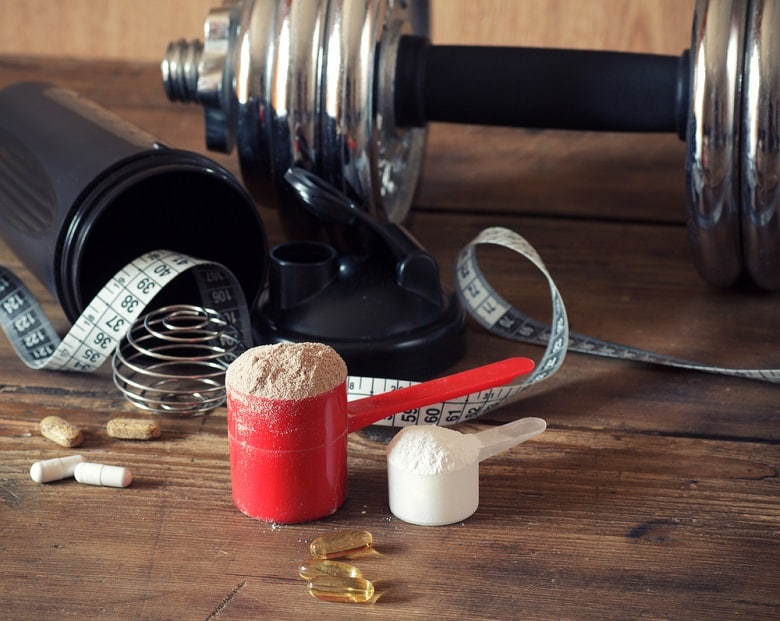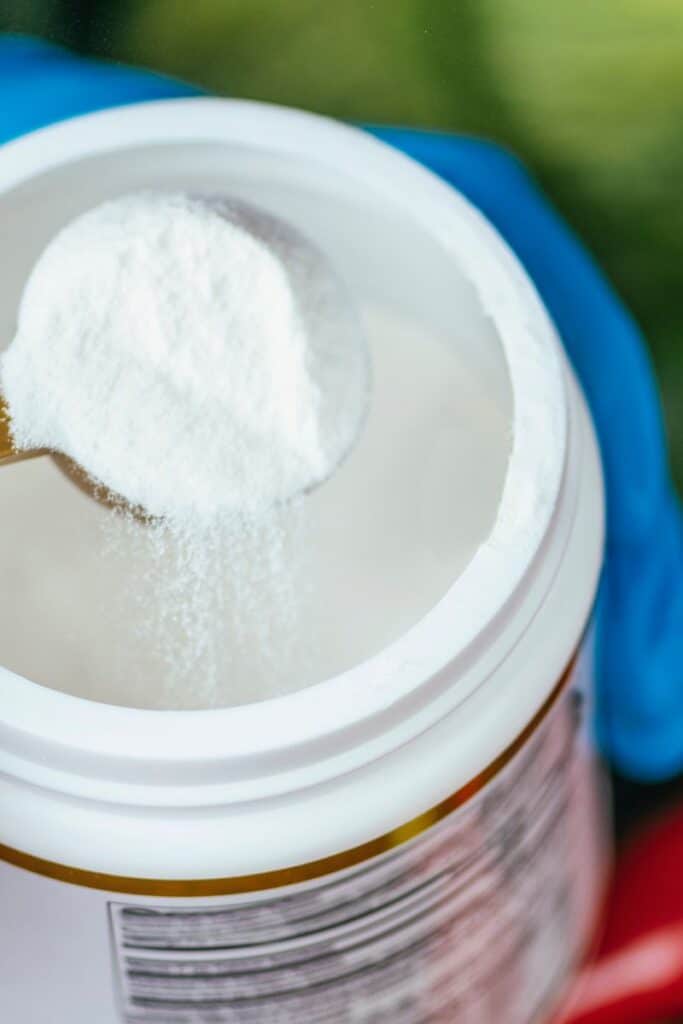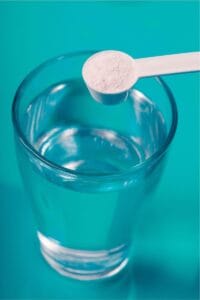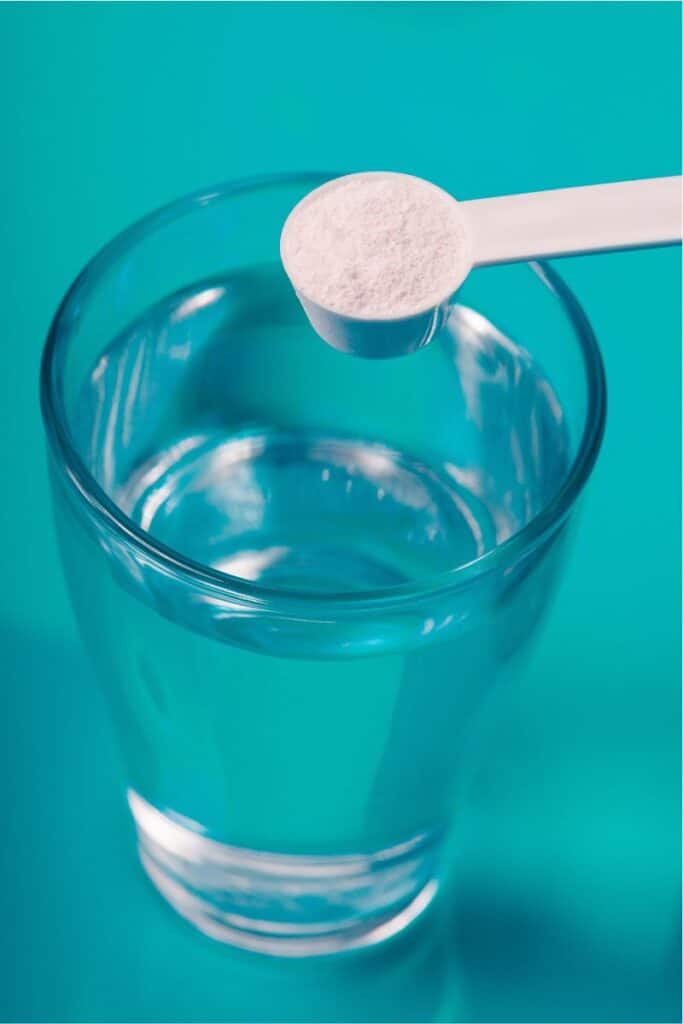Creatine Benefits for Runners and Endurance Athletes
- January 2, 2023
- Last Updated: February 16, 2024
- 0 Comments
- Running
Is creatine for runners helpful for speed, improvements and performance? Can it help both endurance and strength athletes? This post will break down what creatine is, what the research says and how you can implement it.
As an Amazon Associate, I may earn from qualifying purchases. You can read more here on our Disclaimer and Privacy Page.
Disclaimer – This post is for informational purposes only and is not for diagnosing or treatment. See your medical provider or Registered Dietitian for individual recommendations.
As a sports dietitian, I can’t tell you how many athletes ask me about the creatine benefits for runners. It comes up in nearly every group talk, and often in individual sessions, too.
If you have questions about creatine and running, such as what it is, reasons you may want to take it, and how to incorporate it in your diet, this post is for you.
Most of the research and information about creatine is geared towards weightlifters and other power athletes, but today we’re talking about the benefits of creatine for endurance athletes and long distance runners.
In This Article
What is Creatine?
To understand the pros and cons of creatine for endurance athletes, we first have to understand what creatine truly is.
Creatine is a molecule naturally found in the body (in muscle cells) that is composed of amino acids, namely glycine, methionine, and arginine.
Creatine is involved in supplying energy to the muscles for contraction, which is why we are talking about it in terms of athletes and energy production.
Creatine can be especially helpful in producing short term bursts of energy, such as in high-intensity exercises, like heavy lifting or sprinting.

Many people equate creatine to branched chain amino acids (BCAAs), but they aren’t the same thing. Creatine is an amino acid derivative, but it works differently than the branched-chain amino acids, leucine, isoleucine and valine.
In fact, BCAAs for runners play a totally different role in training. Here’s a great differentiation between BCAAs vs creatine for runners.
Where is Creatine Made?
The liver, kidneys, and pancreas work together to produce 1-2 grams of creatine per day in our bodies. As you’ll see below in the creatine supplementation guide, 5 grams of creatine per day is usually recommended.
About 95% of creatine in the body is stored in skeletal muscle, with the remaining 5% in the brain (more on why that’s important later).
Our bodies make creatine and we get also get it through the diet and supplementation.

How Does Creatine Work For Athletic Performance?
Let’s dive into the exercise physiology for a second to understand creatine and how it may benefit runners, power lifters, athletic performance, and how it impacts our bodies.
The body has three different metabolic processes that it uses to produce energy: the phosphagen system, anaerobic glycolysis, and the oxidative system.
At any given time, all energy systems are working, but the intensity and duration of exercise are what really determine which metabolic process is dominant for the activity at hand.
- The phosphagen system is responsible for extremely quick bursts of high-intensity exercise, like the 40-yard dash or a powerful lift.
- Anaerobic glycolysis dominates high-intensity exercise that lasts slightly longer, like 30 seconds to two minutes.
- Aerobic glycolysis kicks in more heavily for low-to-moderate-intensity exercise that lasts longer than two to three minutes, which is where most of our running training fits in.

Creatine For Quick Energy
Now, let’s zoom in on the phosphagen system, as this is where creatine monohydrate for runners comes into play.
In the phosphagen system, creatine phosphate donates the phosphate to ADP to create ATP (adenosine triphosphate), the molecule that the body uses for energy. This process leaves creatine on its own, ready to be paired up with another phosphate and repeat the process.
When you supplement with creatine, you increase the amount of creatine in the body that can bind with phosphate and turn ADP into ATP.
In other words, creatine facilitates a greater capacity to rapidly resynthesize ATP and buffer hydrogen ion accumulation, meaning your body has a greater potential for quick energy and power output.
And, when co-ingested with carbohydrates (like energy gels or recovery drinks), creatine enhances glycogen resynthesis and content.

Should Runners Take Creatine?
We just reviewed how creatine can help for short exertions and efforts that require quick energy.
Most runners, however, are running much longer and not maintaining an anaerobic threshold for long.
A variety of athletes may take creatine, but the body’s demand for creatine depends on the type of exercise the athlete is engaging in.
Because power athletes engage in very short bouts of high-intensity exercise, they have higher creatine demands than endurance athletes.
For this reason, creatine supplementation is more common amongst weightlifters and strength and power athletes, like football players, than distance runners or cyclists.
Creatine for marathon runners won’t necessarily help avoid hitting the wall, getting you to the finish line, or lengthening the distance before fatiguing.
Instead, your race day breakfast and race day nutrition plan will make a bigger difference.
That’s not to say runners shouldn’t take it – but let’s break down when it may or may not be helpful, according to recent research.

Pros of Creatine Supplements For Distance Runners
Here are some beneficial effects and research-backed reasons that creatine for runners may be helpful.
- improve the results of cross-training and interval training
- improve the ability to push oneself during critical points of a race.
- increase the capacity of the phosphagen system
- greater increases in strength and lean muscle mass when committing to weekly resistance training
- Those who use creatine may experience less soreness and quicker recovery following resistance exercise than they would without creatine.
- increased training tolerance and time to exhaustion
- can enhance glycogen resynthesis when co-ingested with carbohydrates (for example, after a workout) which can be helpful for recovery
- May be especially helpful for older runners and/or plant-based athletes
To further explain this, distance running relies primarily on the aerobic energy system, as we discussed above.
But, increasing the capacity of the phosphagen system allows the athlete to increase the intensity of their exercise for a short duration beyond what the aerobic system can offer.

General exercise guidelines recommend participating in resistance-based exercise at least twice per week (like this upper body workout for runners).
Runners who follow this suggestion may see greater increases in strength and muscle mass when using creatine and getting enough protein overall (more on whey protein vs. creatine in this post).
Runners competing in shorter distances, like the mile race, or even the 5k or 10k may see more benefits of creatine supplementation.
Athletes who demand significant cumulative energy, such as long-distance races, biking, or triathlons may even see benefits and performance enhancements with creatine supplementation.
Cons of Creatine for Runners
- Doesn’t lead to improved performance
- May lead to some water retention and weight gain (especially from the creatine loading phase), which may not be desirable for some runners. This side effect isn’t dangerous—it may actually prevent dehydration—but it may be undesirable by some looking to maintain or lose weight.
- It may be contra-indicated for certain health conditions – always make sure to check with your provider!
- If you’re taking certain medications or diuretics, talk to your healthcare provider before starting supplementation.
Much of the research shows that creatine won’t necessarily enhance performance, and some of it is mixed as to whether it will even enhance metabolic adaptations. There is research on both sides of this argument.
However, aside from the extra money spent, there are not really any negative drawbacks to taking creatine for running and training.
TRY BUTCHER BOX TODAY for a natural dietary source of creatine! Butcher Box sends you nourishing, grass-fed, organic meat and seafood. My personal favorites are the wild caught salmon, chicken drumsticks, and ground bison. We have so many recipes with these nutritious, delicious ingredients, like this salmon below.
Check out my favorite Butcher Box options

Special Considerations for Creatine Supplementation for Endurance Athletes
A couple of special populations may also benefit from creatine supplementation: injured athletes and plant-based athletes.
Injured Athletes – Because creatine increases muscle mass and expedites recovery, it will help preserve muscle mass in injured athletes and speed up their healing.
Plant Based Athletes – Regarding plant-based athletes or those following a vegan diet, the best sources of dietary creatine are going to be red meat, poultry, and fish.
Therefore, vegans and vegetarians are naturally consuming less creatine than the general population and may be more interested in considering creatine supplementation.
By supplementing with creatine, they can boost their creatine stores to similar baseline levels to their omnivorous counterparts.
KEY TAKEAWAY
If a runner does struggle with recovery, maintaining muscle mass, or pushing intensity during a race, creatine might be helpful, but for the average runner, creatine supplementation isn’t and shouldn’t be the first move.

How to Supplement with Creatine
So, you’ve decided you want to start supplementing with creatine to test out some of the reported benefits on speed work, training and recovery.
- Loading Phase – As you start your supplementation, you might choose to start with a loading phase, which would include taking 20 g/day, split into four separate 5 g doses, for 5-7 days.
- Maintenance Phase – After a loading phase, transition to supplementing with 3-5 g/day for maintenance.
The loading phase is not necessary, but it increases cellular creatine stores more abruptly, so many athletes choose to do it.
If you would rather not do a loading phase, you can choose to start with 3-5 g/day—your cellular creatine stores will just increase more gradually.

Optimal creatine absorption requires proper hydration, so dehydration or diuretics may inhibit absorption.
Also, remember hydration also includes proper electrolyte status.
Electrolytes for runners cannot be minimized!

Should I Take Creatine Before Running?
It doesn’t necessarily matter if you take creatine before running or after running.
You can take it at any time of day, although some research suggests taking it at the same time each day and away from caffeine in order to be the most effective.
Further, take your creatine alongside carbohydrates and protein to maximize absorption.
The Best Creatine for Runners
While supplements for runners shouldn’t be the first ‘answer’ to any solution, there are some instances when they may be helpful, as we discussed throughout this article.
When purchasing your creatine supplement, make sure you choose creatine monohydrate that is third-party certified by an organization like NSF, which ensures that the supplement you are taking actually has what it claims.
Sometimes you pay more for this, but you want to get the reported benefits of creatine supplementation can provide to endurance athletes.
Here are some of the creatine brands for runners that I like to recommend:
References:
- Op ‘t Eijnde, B., Ursø, B., Richter, E. A., Greenhaff, P. L., & Hespel, P. (2001). Effect of oral creatine supplementation on human muscle GLUT4 protein content after immobilization. Diabetes, 50(1), 18–23. https://doi.org/10.2337/diabetes.50.1.18
- Peeters, Brian M.; Lantz, Christopher D.; Mayhew, Jerry L. Effect of Oral Creatine Monohydrate and Creatine Phosphate Supplementation on Maximal Strength Indices, Body Composition, and Blood Pressure, Journal of Strength and Conditioning Research: February 1999 – Volume 13 – Issue 1 – p 3-9
- Forbes SC, Candow DG, Neto JHF, Kennedy MD, Forbes JL, Machado M, Bustillo E, Gomez-Lopez J, Zapata A, Antonio J. Creatine supplementation and endurance performance: surges and sprints to win the race. J Int Soc Sports Nutr. 2023 Dec;20(1):2204071. doi: 10.1080/15502783.2023.2204071. PMID: 37096381; PMCID: PMC10132248.
Support Bucket List Tummy




























Like This Content?
Support Bucket List Tummy